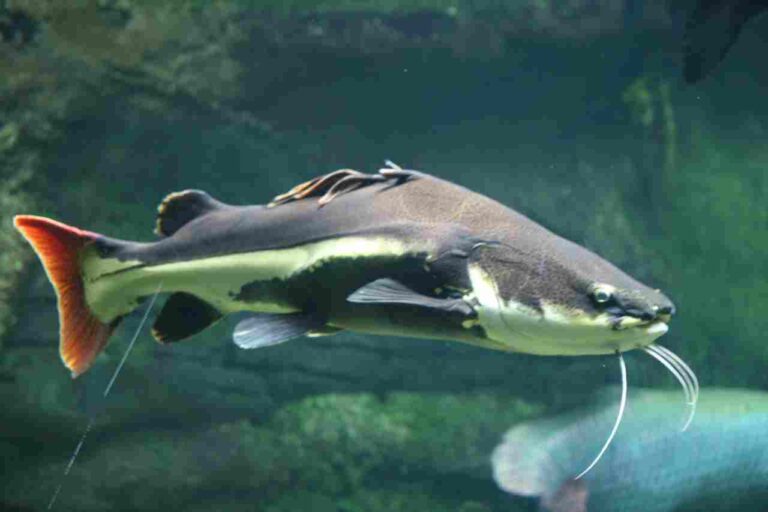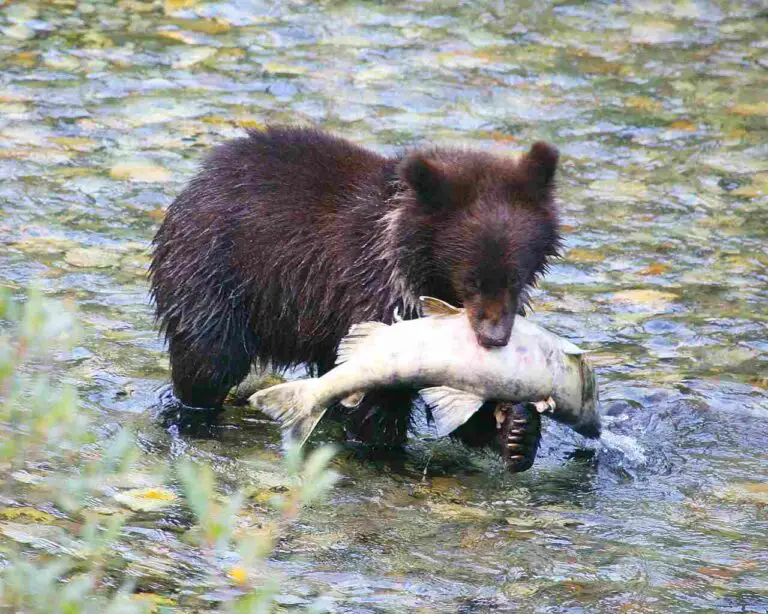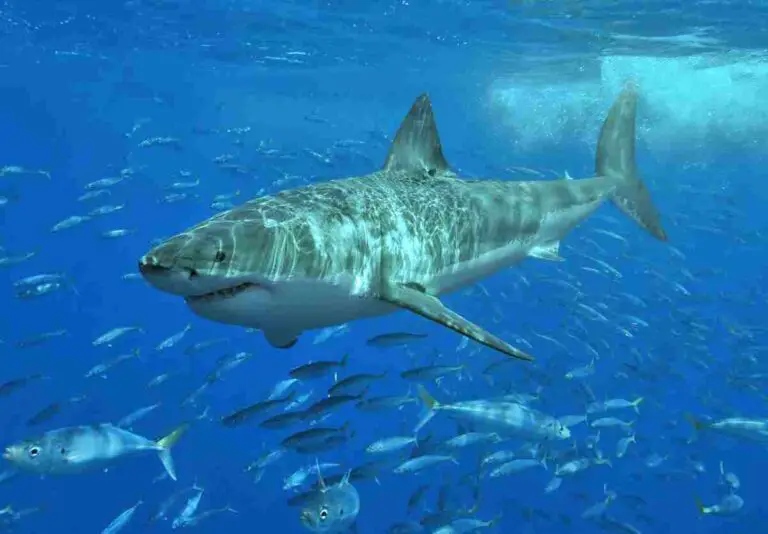Do Sharks Eat Dolphins and Seals? An Evaluation of Shark Diet
Sharks do indeed eat dolphins, particularly the more aggressive species such as great white sharks and bull sharks. This is because sharks are opportunistic predators and will prey on dolphins when their preferred food sources are not available. Sharks may also target vulnerable dolphins, such as those that are sick, injured, or young and unprotected.
Additionally, conflicts for resources can lead to sharks attacking dolphins. It is important to note that while sharks may eat dolphins, it does not necessarily mean that they actively seek them out as a primary food source.
Conditions Under Which Sharks Eat Dolphins
1). Absence of Preferred Food Sources
One of the most prominent causes of shark predation on dolphins is the absence of preferred food sources. Sharks, in general, prefer to feed on small fish rather than cetaceans like dolphins. However, when their preferred food sources are scarce or unavailable, sharks may turn to dolphins as an alternative prey option.
Sharks have a diverse diet that includes a wide range of marine animals, but they are opportunistic feeders. They will take advantage of any available food source when their preferred prey is not abundant. This includes dolphins, especially when other options are limited.
In certain regions or seasons, the usual prey of sharks may migrate or become scarce due to environmental factors. This can create a situation where sharks are forced to seek out alternative food sources, such as dolphins. When dolphins are present in an area where their preferred food sources are absent, they become vulnerable to shark predation.
It’s important to note that not all species of sharks target dolphins as a food source. Some species are more likely to prey on dolphins than others, depending on their size, aggression, and hunting strategies. Additionally, certain individuals within a species may exhibit a preference for dolphins if they are easier to catch or if they are sick, old, injured, or juvenile.
2). Presence of Vulnerable Dolphins
Sharks are more likely to target dolphins when they are vulnerable due to various factors. One such factor is the presence of sick, old, injured, or juvenile dolphins. These individuals are easier targets for sharks because they may be slower or weaker, making them more susceptible to predation.
Additionally, some species of sharks specifically target smaller and less aggressive dolphins. These species may find it easier to catch and consume dolphins that are not as capable of defending themselves. The size and aggression of the shark species play a role in determining which dolphins they are more likely to prey upon.
It’s important to note that not all dolphins are equally vulnerable to shark predation. Dolphins that are in good health and are part of a larger group may have a lower risk of being targeted by sharks. This is because they can rely on the safety of numbers and the ability to defend themselves collectively.
However, when dolphins are isolated or separated from their group, they become more vulnerable to shark attacks. This is especially true for sick, old, injured, or juvenile dolphins, as they may struggle to keep up with the group or defend themselves effectively.
3). Conflict for Resources
While rare, dolphins may pose a threat to territorial sharks as they also compete for prey in the same ecosystem. This competition for resources can lead to conflicts between the two species, resulting in sharks attacking dolphins and sometimes feeding on them.
Sharks are apex predators and play a crucial role in maintaining the balance of marine ecosystems. They rely on a steady supply of food to survive, and when their preferred food sources are scarce, they may resort to targeting dolphins as an alternative. Dolphins, on the other hand, are highly intelligent and social animals that also require a sufficient food supply to thrive.
In areas where prey is limited, such as during seasonal migrations or in areas with overfishing, sharks and dolphins may find themselves competing for the same resources. This competition can escalate into conflicts, with sharks perceiving dolphins as potential rivals for food. In these situations, sharks may attack dolphins to eliminate competition and secure their own food source.
It’s important to note that these conflicts for resources are relatively rare occurrences. Sharks and dolphins have coexisted in the same ecosystems for millions of years, and most interactions between the two species are peaceful. However, when resources become scarce, the competition can intensify, leading to occasional conflicts.
Do Sharks Attack Dolphins?
Sharks attacking dolphins is a significantly common occurrence, particularly in areas like Florida and parts of Australia. This can be observed through the presence of bite scars on many dolphins, indicating previous encounters with sharks. While sharks do attack dolphins, it is not as frequent as their preferred prey, such as smaller fish.
The main reason why sharks attack dolphins is for their flesh and blubber, which serve as valuable sources of energy and nutrients. However, it’s important to note that sharks primarily target vulnerable dolphins, such as calves, sick, or impaired adults. They are less likely to attack larger species like orcas and generally tend to avoid them.
In areas like Florida and certain parts of Australia, the occurrence of shark attacks on dolphins is relatively high. This can be attributed to the abundance of both shark and dolphin populations in these regions. The competition for resources, including prey, can lead to conflicts between the two species, resulting in shark attacks on dolphins.
While sharks are apex predators and play a crucial role in marine ecosystems, they rely on a steady supply of food to survive. When their preferred food sources are scarce, they may resort to targeting dolphins as an alternative. However, it’s important to emphasize that these attacks are not the norm and most interactions between sharks and dolphins are peaceful.
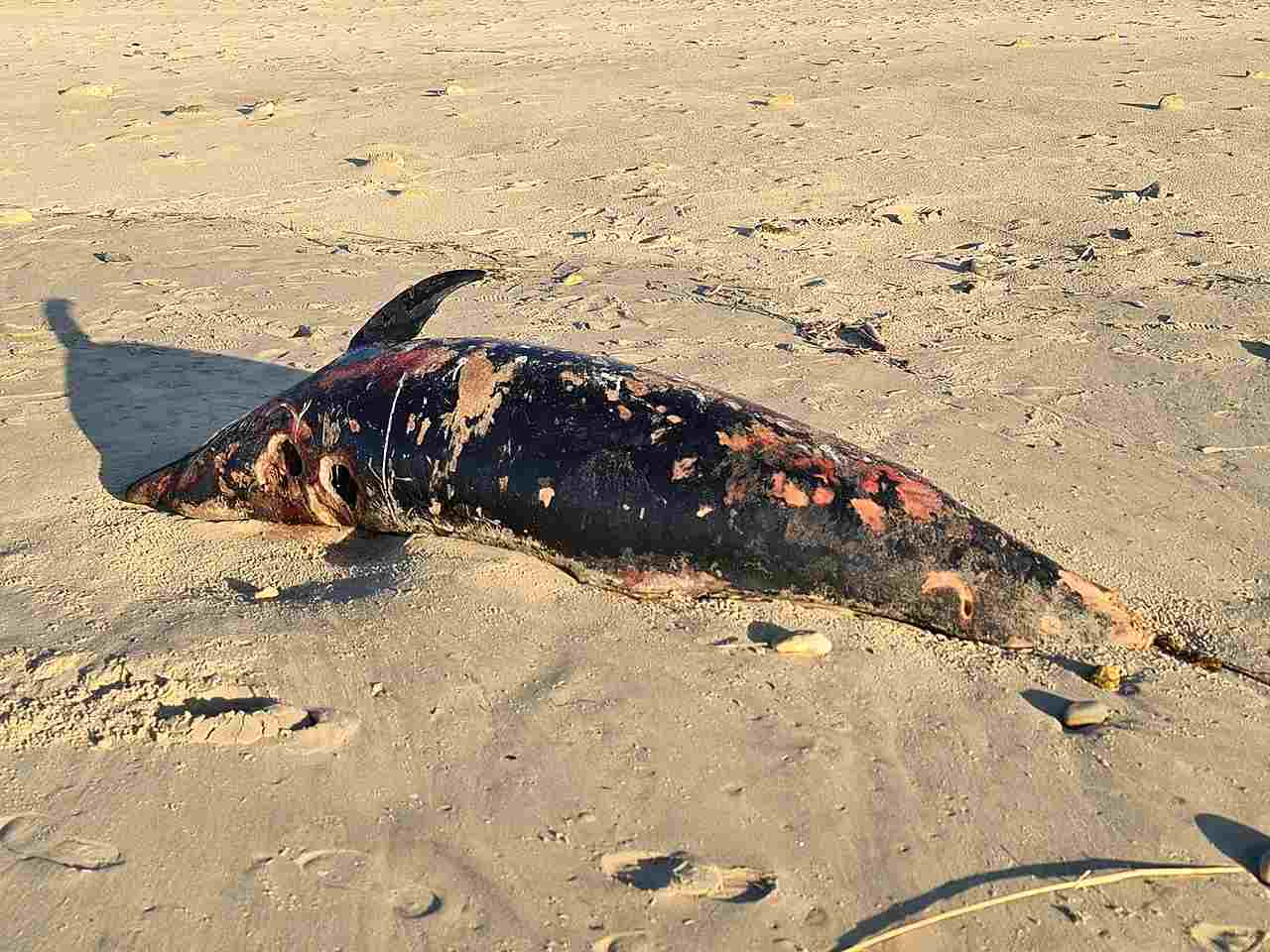
Do Sharks Kill Dolphins?
Sharks killing dolphins is a phenomenon that occurs fairly often, as evidenced by the presence of dolphin carcasses with shark-inflicted severe injuries in coastal areas like Florida. It is important to note, however, that the reverse can also be true. Large dolphins, such as orcas, have been known to kill sharks in some instances.
The relationship between sharks and dolphins is complex and can vary depending on the species involved. While sharks are apex predators and have the ability to kill dolphins, they are more likely to target vulnerable individuals, such as calves or sick adults. Larger species like orcas are generally avoided by sharks.
The occurrence of sharks killing dolphins can be influenced by various factors, including competition for resources and prey. In areas where both shark and dolphin populations are abundant, conflicts can arise, leading to shark attacks on dolphins. These attacks are often driven by the need for food when the sharks’ preferred food sources are scarce.
It is important to understand that while sharks do kill dolphins, these instances are not the norm. Most interactions between sharks and dolphins are peaceful, and sharks primarily rely on other sources of food.
Conditions Under Which Sharks Kill Dolphins
1). Presence of Unprotected Calves
When it comes to the presence of unprotected calves, sharks can be more likely to kill dolphins. Calves are vulnerable and easier targets for sharks due to their smaller size and lack of experience in defending themselves. Sharks are opportunistic predators, and they will take advantage of any opportunity to feed on weaker prey.
Calves may also be separated from their protective adult group, making them more susceptible to shark attacks. In these situations, sharks can quickly overpower and kill the unprotected calves. This behavior is driven by the instinctual need for survival and the search for an easy meal. The presence of unprotected calves increases the chances of sharks preying on dolphins, highlighting the importance of group cohesion and protection within dolphin pods.
2). Sick, Aged or Injured Adults
Sick, aged, or injured adult dolphins are also at risk of being killed by sharks. When dolphins are in a weakened state, they become easier targets for sharks looking for a meal. Sick dolphins may have compromised immune systems or reduced mobility, making it difficult for them to evade shark attacks. Aged dolphins may have decreased agility and slower reaction times, making them more susceptible to shark predation. Injured dolphins, with wounds or disabilities, are also more vulnerable to shark attacks.
Sharks are skilled predators that can sense and target dolphins that are in a weakened condition. They take advantage of the opportunity to prey on dolphins that are less able to defend themselves. This behavior is driven by the instinctual need for survival and the search for easy prey. Sick, aged, or injured adult dolphins are at a higher risk of falling victim to shark attacks, highlighting the importance of maintaining good health and fitness within dolphin populations.
3). Cooperative Opportunistic Predation
Sharks can also engage in cooperative opportunistic predation to attack and kill healthy adult dolphins. This occurs when sharks work together to increase their chances of successfully capturing and consuming their prey. By coordinating their movements and actions, sharks can create a strategic advantage over the dolphins, making it difficult for them to escape.
Cooperative opportunistic predation is often observed when dolphins are in large groups or pods. Sharks will strategically position themselves around the pod, cutting off escape routes and creating confusion among the dolphins. This coordinated effort increases the likelihood of a successful attack.
Furthermore, sharks may target healthy adult dolphins that are separated from the safety of the pod. These individuals are more vulnerable and easier to isolate, making them prime targets for cooperative opportunistic predation.
By working together, sharks can overcome the agility and intelligence of dolphins, leading to successful predation. This behavior highlights the adaptability and resourcefulness of sharks in their pursuit of prey.
Do Great White Sharks Eat Dolphins?
Great white sharks are indeed one of the most common shark species that eat dolphins. In fact, their predation rate on dolphins is at least five times higher than the rate at which dolphins are known to eat sharks. Great white sharks typically ambush dolphins, either alone or in groups, depending on the size of the dolphin.
For example, there have been recorded instances of great white sharks preying on dolphins at Torrey Pines State Beach, just north of a popular surf spot, in early 2023. These sightings, along with many others, serve as proof of their predation behavior.
Similar to other sharks, great whites target the most vulnerable individuals within a dolphin pod. This includes old, sick, injured dolphins, as well as calves. However, it’s important to note that dolphins are not the main prey for great white sharks.
Great white sharks have a diverse diet that includes a variety of marine mammals, such as seals and sea lions, as well as other sharks, smaller fish, seabirds, mollusks, and crustaceans. Dolphins are just one of the many prey items that great white sharks opportunistically feed on.
Do Tiger Sharks Eat Dolphins?
Tiger sharks are indeed one of the shark species known to feed on dolphins, along with great white sharks and bull sharks. These apex predators have a diverse diet that includes not only dolphins but also other marine mammals such as seals and sea lions. In addition, tiger sharks consume a wide range of prey, including other sharks, smaller fish, seabirds, mollusks, and crustaceans.
When it comes to dolphins, tiger sharks exhibit opportunistic feeding behavior. They target vulnerable individuals within a dolphin pod, such as sick, injured, or young dolphins. This predatory behavior is influenced by various factors, including the availability of prey and the presence of vulnerable dolphins.
Tiger sharks are known for their powerful jaws and serrated teeth, which enable them to consume a wide variety of prey. Their diet is not limited to dolphins alone, as they are capable of hunting and consuming a diverse range of marine organisms. This adaptability allows tiger sharks to thrive in different marine ecosystems and take advantage of available food sources.
While tiger sharks do eat dolphins, it’s important to note that dolphins are not their primary prey. Tiger sharks have a broad diet and are considered opportunistic predators, meaning they will consume whatever prey is readily available. Their feeding habits are influenced by factors such as the abundance of prey, competition for resources, and the vulnerability of potential targets.
Do Sharks Eat Seals?
Sharks, particularly great white sharks, are known to be the main predators of seals in many marine ecosystems. Seals provide sharks with a valuable source of energy and nutrients. While not all shark species prey on seals, those that do, such as great white sharks, have adapted to take advantage of this food source.
Seals, like fur seals, are a preferred prey item for sharks due to their relatively easy accessibility. Seals spend a significant amount of time in the water, making them vulnerable to shark attacks. Additionally, seals have a high dietary value for sharks, providing them with a substantial amount of fat and protein.
It’s important to note that sharks not only consume seals but also include smaller sharks as part of their fish prey. Sharks are opportunistic predators and will take advantage of any available food source. This adaptability allows them to maintain a diverse diet and thrive in various marine environments.
Why Sharks Eat Seals
1). Relatively Easy Accessibility
Sharks have been known to prey on seals due to their relatively easy accessibility. Seals, being relatively slow swimmers, make for an ideal target for sharks compared to fast-swimming fish. This accessibility is one of the reasons why sharks choose to eat seals.
Seals often gather in large numbers, especially during breeding seasons or when they are resting on land. These gatherings provide a concentrated food source for sharks, making it easier for them to locate and capture their prey. The abundance of seals in certain areas increases the chances of successful hunting for sharks.
Furthermore, seals spend a significant amount of time in the water, making them vulnerable to shark attacks. They rely on the water for hunting, resting, and escaping from predators. This constant presence in the water increases the likelihood of encounters with sharks, especially in areas where sharks are known to frequent.
The slow swimming speed of seals also plays a role in their vulnerability to shark predation. Sharks are highly adapted predators, capable of reaching impressive speeds in the water. Their agility and speed give them an advantage when hunting, allowing them to catch up to and capture slower-moving prey like seals.
2).Dietary Value
Seals provide sharks with a valuable source of nutrition, making them an attractive prey choice. Seals are rich in fat, which serves as a high-energy fuel for sharks during long periods between meals. The high fat content in seals helps sharks meet their energy requirements and sustain their metabolic needs.
In addition to being rich in fat, seals also offer a good source of protein for sharks. Protein is essential for the growth, maintenance, and repair of the shark’s body tissues. It provides the necessary building blocks for muscle development and overall health. By consuming seals, sharks can obtain the protein they need to support their physiological functions.
The dietary value of seals is further enhanced by the presence of other essential nutrients. Seals contain vitamins and minerals that contribute to the overall health and well-being of sharks. These nutrients play a vital role in various biological processes, including immune function, reproduction, and energy metabolism.
The combination of energy, nutrients, and dietary value makes seals an important food source for sharks. The nutritional benefits derived from consuming seals help sharks thrive in their marine ecosystems. By targeting seals as prey, sharks can meet their energy demands and maintain their overall health and fitness.
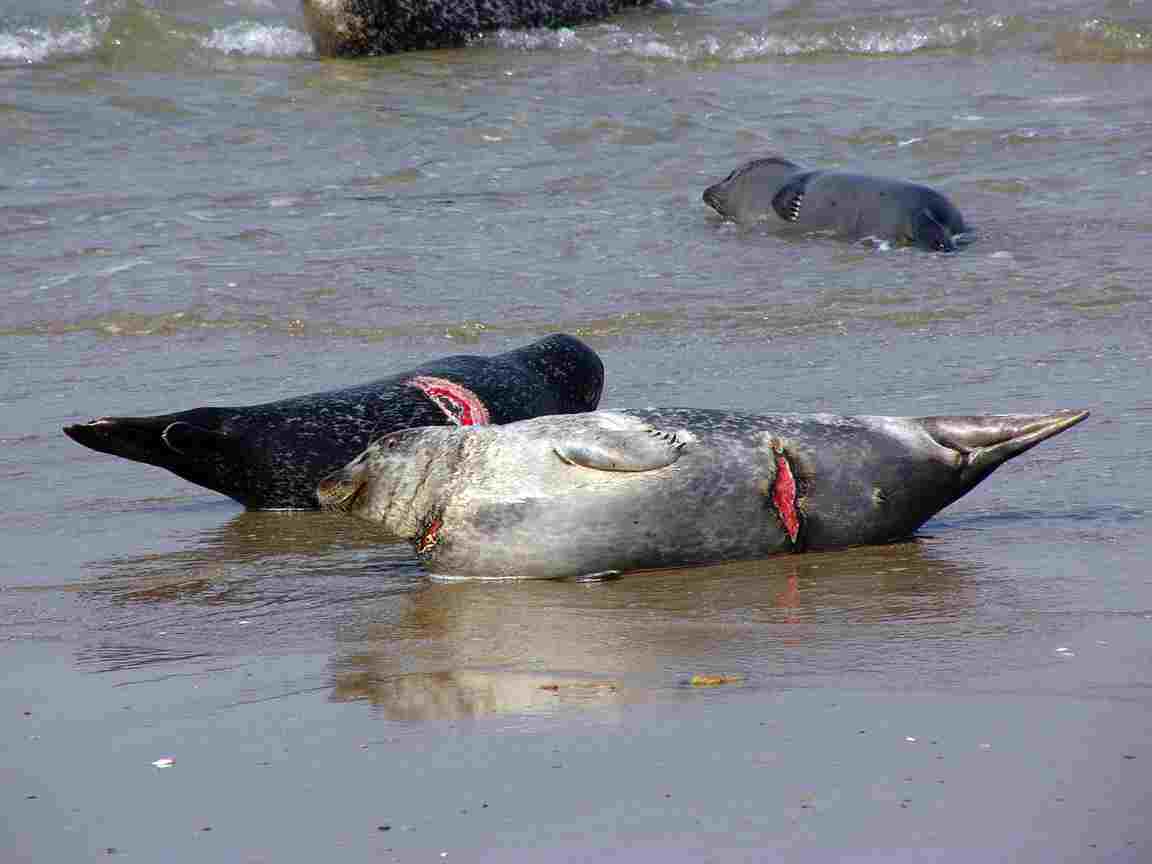
3). Low Resistance
One of the reasons why sharks eat seals is their low resistance during hunting. Unlike many adult shark species, seals are not as large or aggressive, which means they do not pose a significant risk of injury to sharks. This low resistance makes seals an ideal prey choice for sharks, especially when it comes to their hunting strategy of ambush.
Sharks are known for their ability to surprise their prey by launching sudden attacks from below. This hunting strategy requires prey that is not too large or powerful, as it allows the shark to overpower and capture its target quickly. Seals, with their relatively smaller size and less aggressive nature, are well-suited for this type of hunting approach.
The low resistance offered by seals makes them an attractive and accessible food source for sharks. It allows sharks to efficiently capture and consume seals without expending excessive energy or risking injury. This efficiency is crucial for sharks, as it ensures they can obtain the necessary nutrients and energy from their prey while minimizing the potential costs associated with hunting.
Do Sharks Eat Sea Lions?
Sharks are known to have a diverse diet, and while they primarily feed on fish and marine mammals, the question remains: do sharks eat sea lions? The answer is yes, some shark species like the Shortfin mako sharks occasionally prey on sea lions, along with other marine animals such as porpoises, bony fish, invertebrates, and even other sharks.
Sea lions, despite their agility and strength, are not exempt from becoming prey for certain shark species. While they are highly skilled swimmers and possess sharp teeth, sea lions can still fall victim to the predatory nature of sharks. However, it is important to note that not all shark species actively hunt sea lions as part of their diet.
The diet of sharks varies depending on their species, habitat, and availability of prey. Some shark species, like the Great White shark, are known to primarily feed on marine mammals such as seals and sea lions. These sharks have adapted to hunting larger prey and possess the necessary strength and size to overpower their targets.
The predation of sea lions by sharks can occur under specific conditions. One of these conditions is the presence of an abundance of sea lions in an area where sharks are known to inhabit. When sea lions gather in large numbers, it increases the likelihood of encountering sharks and becoming potential prey.
Another factor that may contribute to sharks preying on sea lions is the vulnerability of certain individuals within the sea lion population. Sick, injured, or young sea lions are more susceptible to predation as they may be slower or weaker compared to healthy adults. Sharks are opportunistic predators and will target individuals that are easier to capture and subdue.
It is worth noting that while sharks may occasionally eat sea lions, the reverse can also occur. Sea lions are known to be opportunistic predators themselves and have been observed preying on smaller sharks. This highlights the complex dynamics of predator-prey relationships in marine ecosystems.
Conclusion
* In the previous sections, we explored the conditions under which sharks eat dolphins, including the absence of preferred food sources, the presence of vulnerable dolphins, and conflicts for resources. We also discussed whether sharks attack or kill dolphins, and the specific conditions under which sharks kill dolphins, such as the presence of unprotected calves and sick or injured adults. Additionally, we examined whether great white sharks and tiger sharks eat dolphins, and the factors that contribute to sharks preying on dolphins.
* Moving on, we delved into the topic of whether sharks eat seals and the reasons behind it. We discovered that sharks are attracted to seals due to their relatively easy accessibility, dietary value, and low resistance. Furthermore, we explored the question of whether sharks eat sea lions and highlighted the complex dynamics of predator-prey relationships in marine ecosystems.
* In conclusion, sharks have a diverse diet that includes dolphins, seals, and sea lions under specific conditions. The predation of these marine mammals by sharks is influenced by factors such as the availability of preferred food sources, the vulnerability of the prey, and the opportunistic nature of sharks.
FAQs
1. What Animals Eat Dolphins?
Dolphins, although apex predators in their immediate environment, can still fall prey to certain animals under specific circumstances. Some of the animals that eat dolphins include great white sharks, dusky sharks, bull sharks, tiger sharks, and even humans. Dolphins are usually at the top of the food chain and have no natural predators in their immediate environment. However, vulnerable calves, injured, old, or sick dolphins may become targets for predators. Additionally, when there is a scarcity of food or when territories overlap, dolphins may also be at risk of being hunted by sharks.
Sharks, in particular, pose a threat to dolphins due to their predatory nature and ability to detect and capture their prey. Great white sharks, dusky sharks, bull sharks, and tiger sharks are known to hunt dolphins. These sharks are equipped with sharp teeth and powerful jaws, allowing them to effectively capture and consume dolphins when the opportunity arises.
While dolphins are generally skilled at avoiding predation, they are not completely immune to being hunted by certain animals in their ecosystem.
2. Do Sharks Eat Dolphins?
Yes, sharks do eat dolphins, although it is not a common occurrence. Sharks are opportunistic predators and will target dolphins when the opportunity arises. Great white sharks, dusky sharks, bull sharks, and tiger sharks are known to hunt dolphins. These sharks have sharp teeth and powerful jaws that enable them to effectively capture and consume dolphins.
Dolphins, being highly intelligent and agile, are generally skilled at avoiding predation. They have developed strategies such as swimming in groups and using their speed and agility to evade sharks. However, vulnerable dolphins such as calves, injured, old, or sick individuals may become targets for sharks.
The predation of dolphins by sharks is influenced by various factors, including the availability of prey, territorial overlap, and the vulnerability of the dolphins.
3. Can Dolphins Kill Sharks?
Dolphins, particularly toothed dolphins like orcas, have been known to exhibit aggressive behavior towards sharks. While it is not common for dolphins to actively seek out and kill sharks, there have been instances where dolphins have been observed defending themselves or their young against shark attacks.
Orcas, also known as killer whales, are the largest members of the dolphin family and are highly intelligent and social creatures. They have been observed hunting and killing sharks by ramming into them or flipping them upside down, which immobilizes the shark and makes it easier for the orcas to deliver fatal blows.
However, it is important to note that these instances of dolphins killing sharks are relatively rare and not a regular occurrence. Dolphins are more inclined to use their intelligence and agility to avoid predation rather than actively seek out and kill sharks.
Generally, while dolphins have the capability to defend themselves against sharks, it is not their typical behavior to actively hunt and kill them.
4. Do Sharks Eat Whales?
Yes, sharks do eat whales, but they primarily act as scavengers rather than actively hunting and preying on them. Sharks are known to feed on whale carcasses that have sunk to the ocean floor. When a whale dies, its body sinks to the bottom of the ocean, providing a feast for various marine organisms, including sharks.
Sharks have a keen sense of smell that allows them to detect the scent of a decaying whale carcass from miles away. They are attracted to the scent and will gather around the carcass to feed. Sharks use their sharp teeth to tear off chunks of flesh from the whale, consuming it as a valuable food source.
However, it is important to note that sharks do not typically attack and kill live whales. Whales are much larger and more powerful than sharks, making them formidable opponents. Instead, sharks take advantage of the opportunity to scavenge on the remains of dead whales, ensuring that no part of the carcass goes to waste.
5. Do Sharks Eat Orcas?
Sharks do not typically eat orcas. Orcas, also known as killer whales, are apex predators in the ocean and are much larger and more powerful than sharks. While sharks may occasionally encounter orcas in their habitats, they are unlikely to prey on them.
Orcas have a diverse diet that includes fish, seals, sea lions, and even other marine mammals. They are highly intelligent and skilled hunters, often working together in coordinated groups to capture their prey. Their size, strength, and hunting strategies make them formidable opponents for sharks.
Sharks, on the other hand, primarily feed on smaller fish, seals, sea turtles, and other marine creatures. They are opportunistic feeders and will scavenge on carcasses or prey on weaker and injured animals. However, orcas are not typically part of their diet.
It is important to note that while sharks and orcas may occasionally interact in the ocean, these encounters are usually not predatory in nature. Both species play important roles in maintaining the balance of marine ecosystems, and their interactions are often driven by factors such as competition for resources or territorial disputes.
6. Do Sharks Eat Turtles?
Sharks do eat turtles, but it is not a common occurrence. Green sea turtles, in particular, are known to be preyed upon by sharks. These turtles have a tough, armored shell that provides some protection, but sharks have powerful jaws that can bite through and shred the turtle’s armor. Once the shell is breached, the shark can easily swallow the turtle.
However, it is important to note that not all shark species prey on turtles. Some sharks, like the tiger shark, are known to have a more varied diet and may opportunistically feed on turtles when the opportunity arises. Other shark species, such as the great white shark, are less likely to target turtles as they primarily feed on marine mammals and fish.
7. What Sharks Hunt Dolphins?
Sharks are not known to deliberately hunt dolphins. However, they may opportunistically prey on dolphins when the opportunity arises. Dolphins are fast and agile swimmers, making them difficult targets for most sharks. Dolphins also have a strong social structure and are known to defend each other, making it even more challenging for sharks to successfully hunt them.
While sharks may not actively seek out dolphins as prey, there are a few shark species that have been observed feeding on dolphins. One example is the bull shark, which has a broad diet and has been known to attack dolphins in certain circumstances. Tiger sharks, known for their varied diet, may also opportunistically feed on dolphins.
8. Do Tiger Sharks Eat Dolphins?
Yes, tiger sharks are known to eat dolphins, along with bull sharks and great white sharks. While dolphins are not a primary food source for tiger sharks, they are opportunistic feeders and will consume dolphins if given the chance. Tiger sharks have a diverse diet and are known to eat a variety of marine animals, including lobsters, crabs, shellfish, bony fish, stingrays, squid, turtles, porpoises, seabirds, smaller sharks, seals, sea lions, and vulnerable whales.
Their versatility as feeders allows them to adapt to different food sources depending on availability. However, it’s important to note that tiger sharks do not specifically target dolphins as their main prey. Instead, they may consume dolphins when they come across them during their feeding activities.
9. What Animals Do Tiger Sharks Eat?
Tiger sharks have a diverse diet, making them versatile and opportunistic feeders. They consume a variety of marine animals, including lobsters, crabs, shellfish, and bony fish. Stingrays and squid are also part of their diet, along with turtles, porpoises, and seabirds. Smaller sharks, such as reef sharks, are not safe from the appetite of tiger sharks. Additionally, tiger sharks have been known to prey on seals, sea lions, and vulnerable whale species.
Their ability to adapt to different food sources depending on availability allows them to survive in various marine ecosystems. However, tiger sharks do not specifically target dolphins as their main prey. While they may consume dolphins when they come across them during their feeding activities, dolphins are not a primary food source for tiger sharks.
10. Do Bull Sharks Eat Dolphins?
Bull sharks, along with tiger sharks and great white sharks, are known to eat dolphins. These powerful predators have a diverse diet and are opportunistic feeders. While dolphins are not their primary food source, bull sharks will consume them when the opportunity arises.
Bull sharks have a reputation for being aggressive and are capable of hunting and capturing a wide range of prey. They are known to inhabit both freshwater and saltwater environments, making them adaptable hunters. In addition to dolphins, bull sharks also feed on fish, crustaceans, and smaller marine mammals.
Their ability to thrive in various habitats and their opportunistic feeding behavior make bull sharks formidable predators. While dolphins may not be their main target, bull sharks will not hesitate to take advantage of any available food source, including dolphins.
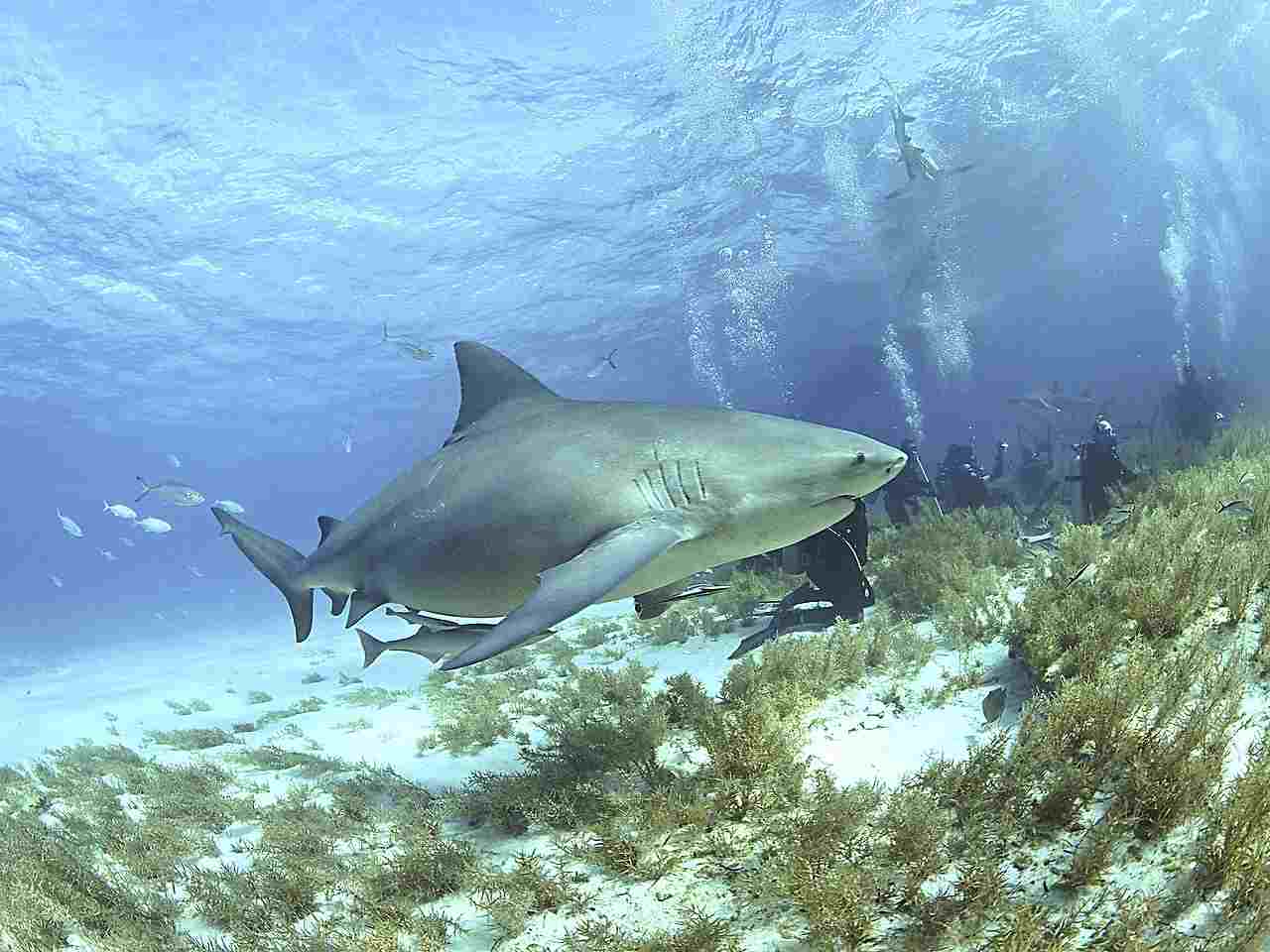
11. Do Hammerhead Sharks Eat Dolphins?
Hammerhead sharks do eat dolphins, but it is not a major part of their diet. They primarily target unprotected calves and sick adult dolphins. Hammerhead sharks have a unique head shape that allows them to have a wider field of vision, which helps them locate and capture their prey. However, their preferred food sources are fish, crustaceans, and smaller marine mammals.
While hammerhead sharks are known for their distinctive appearance and hunting behavior, dolphins are not their primary target. These sharks are more inclined to feed on other marine creatures that are more readily available and easier to catch. Their diet is diverse, and they are opportunistic feeders, adapting to the food sources in their environment.
12. Do Sharks Eat Seals in The Ocean?
Sharks do eat seals in the ocean, especially great white sharks. These powerful predators have been known to target seals as part of their diet. Seals are a source of high-energy food for sharks, providing them with the necessary nutrients for survival. Great white sharks are particularly skilled hunters, using their speed and agility to ambush seals near the water’s surface.
They often launch surprise attacks from below, catching their prey off guard. Seals are a valuable food source for sharks, and their abundance in certain areas can attract these apex predators. However, it’s important to note that sharks have a diverse diet and will also feed on other marine creatures depending on availability.
13. Do Sharks Eat Penguins?
Yes, sharks do eat penguins, along with various other seabirds. Penguins are a part of the diet for certain shark species, especially those that inhabit the same regions as penguins. Sharks are opportunistic predators and will take advantage of any available food source, including seabirds that venture into the water. Penguins, with their streamlined bodies and agile swimming abilities, are not immune to shark attacks.
Sharks may target penguins near the water’s surface, using their speed and stealth to catch them off guard. While penguins are not a primary food source for sharks, they can still become prey in certain circumstances.
14. Do Sharks Eat Seals in South Africa?
Yes, sharks do eat seals in South Africa, particularly the Cape fur seal found near Seal Island off the coast. Seals are a common prey for certain shark species in this region. Sharks are skilled hunters and will take advantage of the abundance of seals in the area.
Seals are not defenseless, though. In some cases, they may even prey on small sharks or work together to fend off shark attacks. This dynamic between seals and sharks adds an interesting twist to their interactions in South Africa’s waters.
Seal Island, with its large seal population, attracts sharks looking for an easy meal. The seals’ agility and speed in the water make them challenging targets, but sharks use their stealth and hunting skills to catch them off guard.
15. Do Sharks Eat Seals in Florida?
Yes, sharks do eat seals in Florida, especially during the summer when large numbers of great white sharks hunt in the coastal area. These sharks primarily feed on seals, as well as other marine mammals. The abundance of seals in the region attracts sharks looking for a food source.
Seals in Florida are not defenseless, though. They have developed strategies to evade shark attacks, such as swimming in groups or seeking refuge in shallow waters. However, sharks are skilled hunters and can still catch seals off guard.
The interaction between sharks and seals in Florida’s waters is a fascinating dynamic that highlights the complex predator-prey relationships existing in marine ecosystems.



